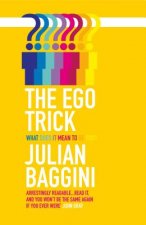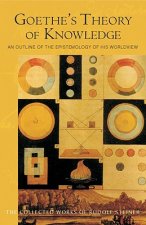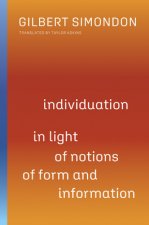
Code: 09361179
Philosophy of Metacognition
by Joelle Proust
Does metacognition, i.e. the capacity to form epistemic self-evaluations about one's current cognitive performance, derive from a mindreading capacity, or does it rely, at least in part, on sui generis informational processes? In ... more
- Language:
 English
English - Binding: Paperback
- Number of pages: 380
Publisher: Oxford University Press, 2015
- More about this

You might also like
-

Eye Movement Desensitization and Reprocessing (EMDR) Therapy
83.32 € -

Clan of the Cave Bear
8.75 € -22 % -

Encyclopedia of Ailments and Diseases
27.36 € -23 % -

The Sleep Lady's Good Night, Sleep Tight
17.70 € -22 % -

Sailor Jerry's Tattoo Stencils II
24.04 € -7 % -

Smilodon
109.78 € -

Programming WCF Services 4e
59.77 €
Give this book as a present today
- Order book and choose Gift Order.
- We will send you book gift voucher at once. You can give it out to anyone.
- Book will be send to donee, nothing more to care about.
More about Philosophy of Metacognition
You get 138 loyalty points
 Book synopsis
Book synopsis
Does metacognition, i.e. the capacity to form epistemic self-evaluations about one's current cognitive performance, derive from a mindreading capacity, or does it rely, at least in part, on sui generis informational processes? In The Philosophy of Metacognition Joelle Proust provides a powerful defense of the second position. Drawing on discussions of empirical evidence from comparative, developmental, and experimental psychology, as well as from neuroscience, and on conceptual analyses, she purports to show that, in contrast with analytic metacognition, procedural metacognition does not need to involve metarepresentations. Procedural metacognition seems to be available to some non-humans (some primates and rodents). Proust further claims that metacognition is essentially related to mental agency, i.e. cognitive control and monitoring. 'Self-probing' is equivalent to a self-addressed question about the feasibility of a mental action ('Am I able to remember this word?'). 'Post-evaluating' is a way of asking oneself whether a given mental action has been successfully completed ('Is this word the one I was looking for?'). Neither question need be articulated conceptually for a feeling of knowing or of being right to be generated, or to drive epistemic control. Various issues raised by the contrast of a procedural, experience-based metacognition, with an analytic, concept-based metacognition are explored, such as whether each is expressed in a different representational format, their sensitivity to different epistemic norms, and the existence of a variety of types of epistemic acceptance.
 Book details
Book details
Book category Books in English Humanities Philosophy Philosophy: epistemology & theory of knowledge
54.74 €
- Full title: Philosophy of Metacognition
- Subtitle: Mental Agency and Self-Awareness
- Author: Joelle Proust
- Language:
 English
English - Binding: Paperback
- Number of pages: 380
- EAN: 9780198748175
- ISBN: 0198748175
- ID: 09361179
- Publisher: Oxford University Press
- Weight: 580 g
- Dimensions: 157 × 231 × 26 mm
- Date of publishing: 03. December 2015
Trending among others
-

Outer Limits of Reason
24.85 € -10 % -

Fabric of Reality
11.26 € -28 % -

Hamlet's Mill
22.33 € -19 % -

Trade Like a Stock Market Wizard: How to Achieve Super Performance in Stocks in Any Market
23.24 € -28 % -

What Does It All Mean?
38.63 € -

Knowledge: A Very Short Introduction
9.05 € -26 % -

Narrative Shape of Truth
43.67 € -

John Locke: An Essay concerning Human Understanding
37.83 € -6 % -

Last Word
57.25 € -

Introduction to Objectivist Epistemology
21.63 € -12 % -

Short History of Decay
12.97 € -8 % -

Against Method
25.15 € -2 % -

Ego Tunnel
22.13 € -

Tetralogue
9.75 € -28 % -

Individuation in Light of Notions of Form and Information
30.28 € -9 % -

Experience and its Modes
21.73 € -18 % -

Evidence and Inquiry
19.82 € -13 % -

Brief History of the Soul
33.60 € -

Price of Truth
33.10 € -7 % -

Intuition of the Instant
21.43 € -6 % -

Fear of Knowledge
25.55 € -1 % -

Oxford IB Diploma Programme: Theory of Knowledge Course Companion
83.62 € -

Beyond Good and Evil
9.65 € -26 % -

What Does It All Mean?
52.52 € -

Pearson Baccalaureate Theory of Knowledge second edition print and ebook bundle for the IB Diploma
58.26 € -

Posthuman Knowledge
19.82 € -5 % -

Being Wrong
11.26 € -28 % -

Ecstasy of Communication
13.48 € -21 % -

Manual for Creating Atheists
12.97 € -19 % -

Ego Trick
10.25 € -28 % -

Truth and Method
37.12 € -

Goethe's Theory of Knowledge
20.32 € -19 % -

Objectivity
30.18 € -15 % -

Thought as a System
47.99 € -9 % -

Self and Other
41.45 € -

Reasons and Causes
131.62 € -

Soul of the Marionette
11.26 € -28 % -

Cambridge Companion to Kant's Critique of Pure Reason
31.89 € -21 % -

Truth
14.58 € -18 % -

Artistic Truth
53.13 € -

Self
11.26 € -28 % -

Impossibility
17.20 € -28 % -

Freedom Regained
11.66 € -18 % -

Lectures on the Will to Know
18.51 € -22 % -

Introduction to the Theory of Knowledge
43.67 € -

Individuation in Light of Notions of Form and Information
33.60 € -

Transformative Experience
29.78 € -

Gregory Bateson
22.73 € -10 % -

Agnotology
28.27 € -7 %
Collection points Bratislava a 2642 dalších
Copyright ©2008-24 najlacnejsie-knihy.sk All rights reservedPrivacyCookies



 15549 collection points
15549 collection points Delivery 2.99 €
Delivery 2.99 € 02/210 210 99 (8-15.30h)
02/210 210 99 (8-15.30h)